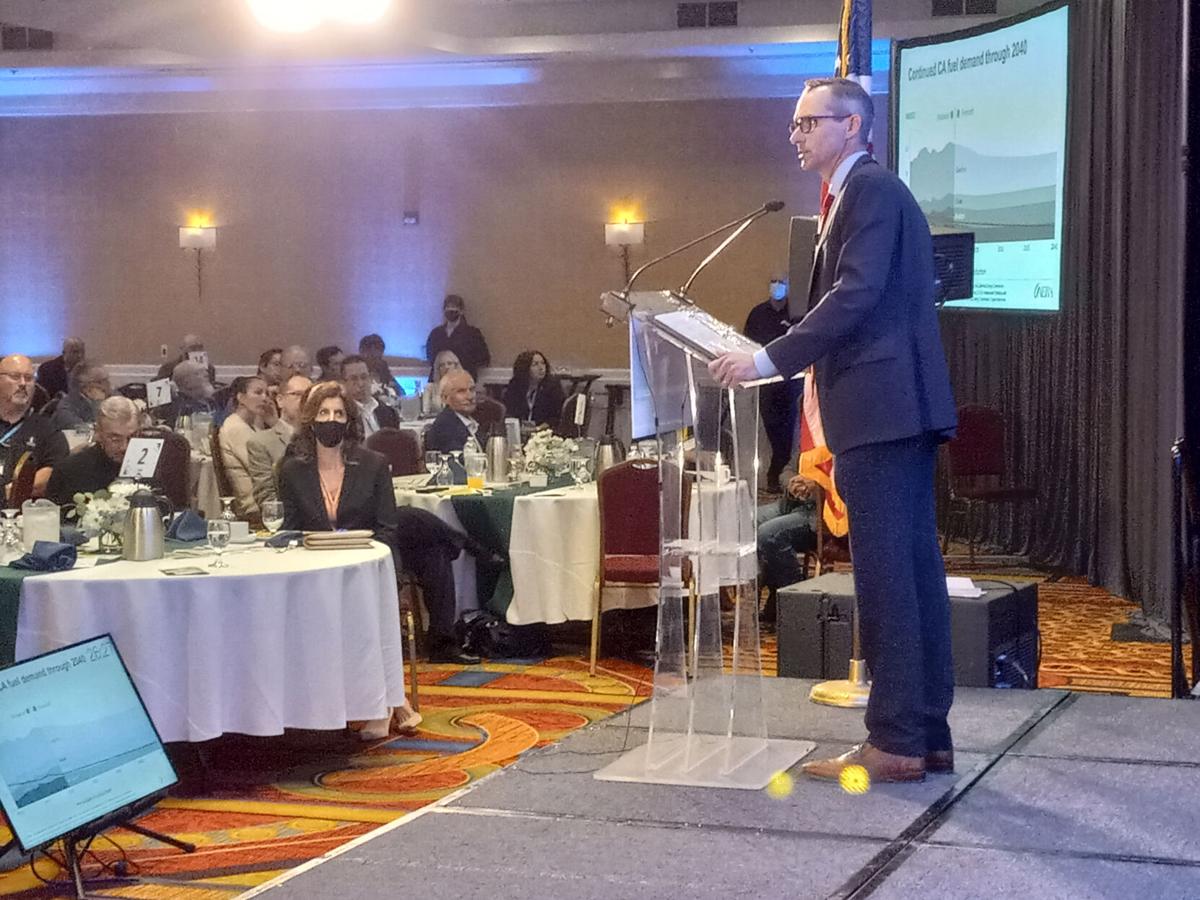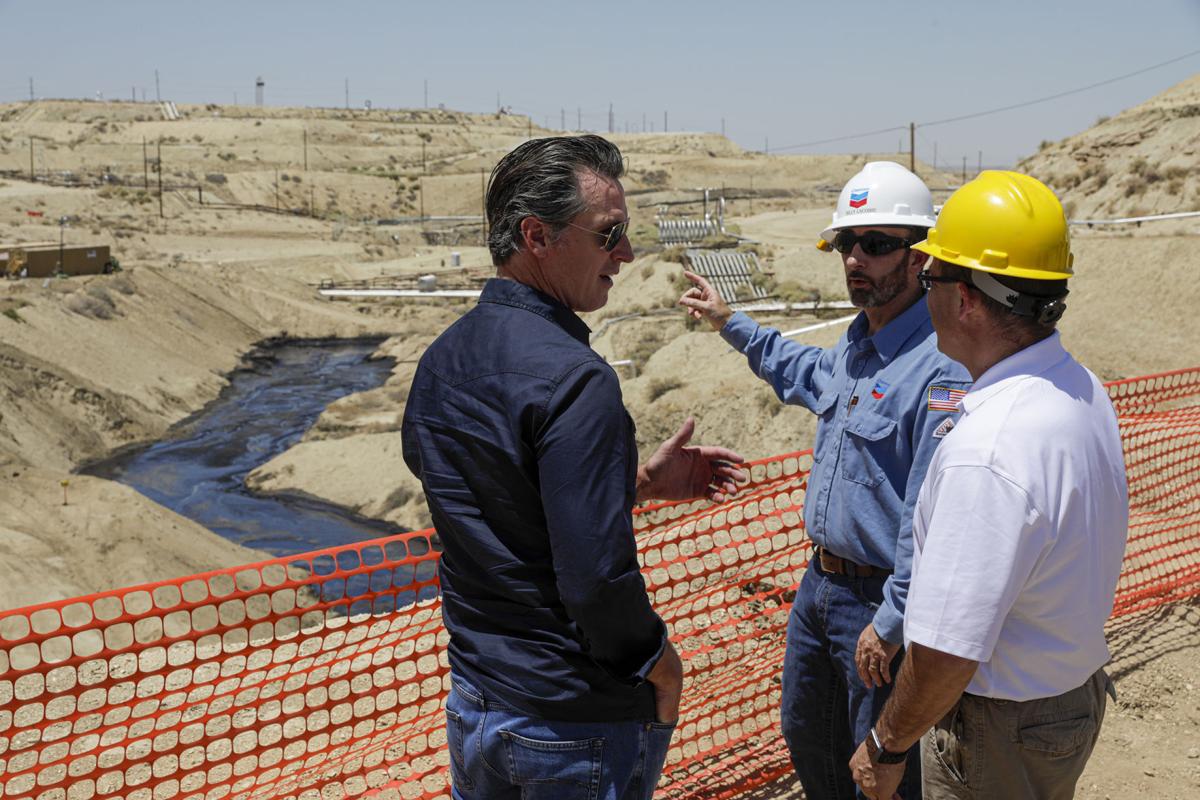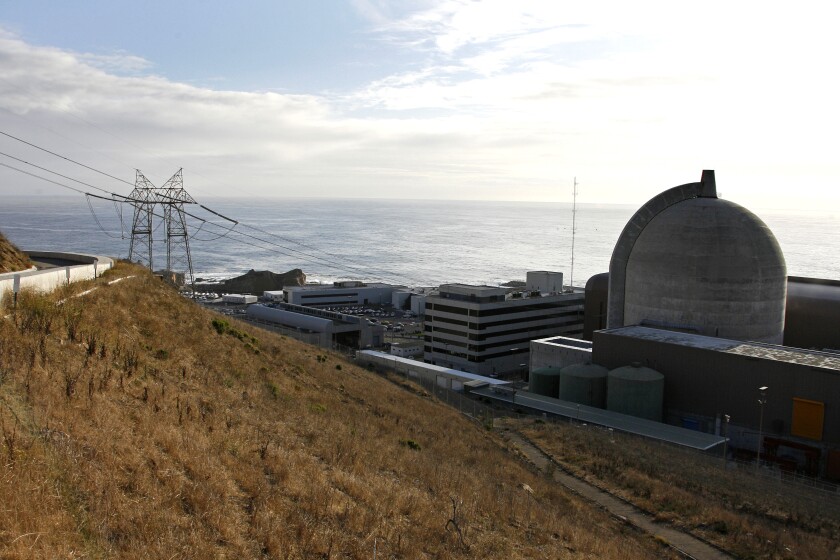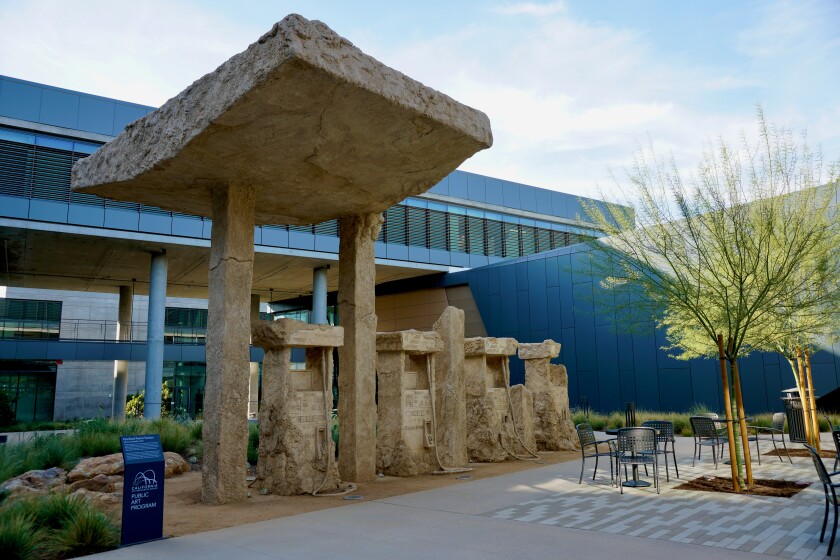Not just fracking: State slows almost all oil permitting
By JOHN COX jcox@bakersfield.com

Erik Bartsch, president and CEO of Bakersfield-based oil producer Aera Energy LLC, addressed the 15th annual Kern County Energy Summit Nov. 10 at the Bakersfield Marriott at the Convention Center.
John Cox / The Californian

Gov. Gavin Newsom, left, is briefed by Billy Lacobie, of Chevron, center, and Jason Marshall, of the then-California Division of Oil, Gas and Geothermal Resources, on July 24, 2019, while touring the Chevron oil field west of Bakersfield, where a spill of about 900,000 gallons flowed into a dry creek bed. Newsom said the state needs to be more aggressive on regulating oil drilling in the state to avoid other major spills.
Irfan Khan / Los Angeles Times / file
Behind California's de-facto fracking moratorium is a broader trend of growing concern to Kern's oil industry: fewer permits for every other type of well work except plugging and abandonments.
Gov. Gavin Newsom has resisted environmentalists' calls to halt all new drilling. But at the same time, his administration has introduced new levels of scrutiny among other changes that have restricted permitting at a time high oil prices have forced the Biden administration to open the Strategic Petroleum Reserve.
State and federal data show that in the two years after Newsom took office in January 2019, California saw a 19 percent drop to 1,796 in permits given annually for new drilling. Permits awarded each year for plugging and abandonment of wells actually jumped 11 percent to 3,001 during that period, while the number awarded for work on existing wells fell 37 percent to hit 1,550.
POLITICAL FOOTBALL
California oil permitting has followed politics since before Newsom became governor. Former Gov. Jerry Brown fired former State Oil and Gas Supervisor Elena Miller in 2011 after a fervent campaign by local executives and pressure by politicians including Rep. Kevin McCarthy, R-Bakersfield.
The main complaint against Miller then was the same as it is now against state regulators: Greater scrutiny and a lack of urgency on the state's part mean it takes longer for oil producers to get a permit that can sustain local jobs and support local tax revenues.
The head of Bakersfield-based oil producer Aera Energy LLC spotlighted the issue Nov. 10 during his keynote speech at this month's Kern County Energy Summit.
QUIET SLOWDOWN
President and CEO Erik Bartsch clicked to show a slide titled "California Permitting Slowdown." It charted big jumps in the number of days the state has taken in recent years to approve underground injection permits and well stimulation projects like fracking, the controversial well-finishing technique also known as hydraulic fracturing.
His point was that Newsom is quietly attacking California's oil supply.
"The phase-out is happening today with no public debate," said the head of Aera, whose state permit denials for frack jobs in western Kern are the subject of a lawsuit pending in Kern County Superior Court.
STATE RESPONSE
The state's primary oil regulator, when presented with industry summaries showing the permitting declines, pointed to the Newsom administration's reprioritization of public health and safety in oil field project reviews, and what it called the most rigorous oversight process in the country.
The California Geologic Energy Management Division pointed to several initiatives ensuring more thorough reviews of oil field operators' permit requests, as well as an in-depth review of the state's permitting process. It acknowledged that additional work has taken time.
It noted a recent audit of the state's permitting review process, CalGEM's introduction of federal scientific reviews of fracking project applications and new regulations on injection work. It also called attention to a moratorium the Newsom administration imposed on certain high-pressure steam injection jobs after a large oil leak near McKittrick.
COURT TWIST
A twist recently arose when a judge ruled against Kern's attempts to institute an over-the-counter permitting process for oil and gas operations. The ruling has, at least temporarily, returned CalGEM to being the lead agency in California environmental reviews of oil field projects.
The agency said in an email its staff will "rigorously review every permit request in accordance with the California Environmental Quality Act."
"This action allows operators to move forward with more than 200 upcoming plugging operations to permanently seal old wells which are no longer in use," CalGEM stated.
INDUSTRY VIEW
The CEO of the California Independent Petroleum Association trade group, Rock Zierman, said the state is fully empowered by the court to permit wells that have already gone through the county process prior to Oct. 6. But he said the agency insists on giving only conditional approval to new wells until the county's permitting case is resolved.
A spokesman for the Western States Petroleum Association trade group said the Newsom administration is making it difficult for oil producers to get the permits they need to produce affordable, reliable energy for the state. He questioned why it's happening at a time President Joe Biden is calling on Russia and OPEC to increase oil production to help lower global fuel prices.
Santa Clarita-based California Resources Corp., responding to questions about the pace of state oil permitting, voiced no complaints as it pursues conventional projects, not involving well stimulation, and "works constructively with state agencies to secure the permitting required to safely produce stable, affordable low-carbon fuel for Californians."
CHEVRON'S COMMENTS
Chevron Corp., when asked the same questions, noted California produces just 30 percent of the oil it consumes and that, as an energy island, in-state production contributes to energy reliability and security.
The company said policies that restrict supply only shift energy production, along with high-paying jobs and tax revenue, to places with lower regulatory standards. It said it supports predictable, consistent permitting that promotes safe, responsible developing of oil and gas resources.
"We need permitting predictability and consistency to build and execute our business plans," a Chevron spokesman wrote in an email.
Did California issue its last fracking permit? Let’s hope so

The sun sets over an oil field near the Kern County community of McKittrick. California regulators this year began denying fracking permits on the grounds of climate change.
(Irfan Khan/Los Angeles Times)
DEC. 17, 2021
There’s been a welcome development in California’s fight against climate change: Regulators are saying no to the oil industry.
Earlier this year, state oil and gas regulators quietly began denying hydraulic fracturing permits on climate change grounds, without waiting to finish regulations to ban fracking by 2024 that Gov. Gavin Newsom has ordered. Since July, the state Geologic Energy Management Division has denied 109 permits sought by oil companies to use hydraulic fracturing or other well stimulation methods, and in 50 of those cases has cited the impacts on the climate and public health.
California has not granted a fracking permit since February. So if the streak of denials continues, it’s possible that will be the last one ever issued.
Let’s hope so. California needs this kind of decisive action, and more of it, to help slow the heating of the planet and do right by the communities near drilling operations, which are disproportionately Black and Latino, and have suffered the health impacts for far too long.

Dec. 12, 2021
In one letter to Aera Energy, State Oil and Gas Supervisor Uduak-Joe Ntuk put the permit denials in the context of deadly heat waves, devastating wildfires, intensifying drought and the need to rapidly decrease fossil fuel extraction to limit global warming to 1.5 degrees Celsius.
“Given the increasingly urgent climate effects of fossil-fuel production, the continuing impacts of climate change and hydraulic fracturing on public health and natural resources,” Ntuk wrote, he “could not in good conscience” grant the company the permits it sought.
A California law that took effect in 2014 requires additional review and permitting for hydraulic fracturing, which involves injecting a mixture of water, sand and chemicals underground at high pressure. But the state had never actually denied a fracking permit until last year.
The denials have prompted lawsuits, including one filed in Kern County Superior Court by the Western States Petroleum Assn., which calls it a “de facto moratorium” on well stimulation permits and says the applications were improperly denied. But as regulators point out, state law gives them discretion over fracking permits and they are not obligated to approve them.
What oil interests really fear is the end of oil and gas production and the elimination of their industry in the state.

OPINION
Editorial: Why a fossilized gas station is the perfect symbol for California’s climate fight
Nov. 23, 2021
But the science is clear: To avert catastrophic climate change we must phase out the extraction and burning of fossil fuels and shift rapidly to emissions-free energy sources. These permit denials affect a small amount of California’s overall oil production, only 2% of which involved hydraulic fracturing in 2020, and the extraction method is almost exclusively limited to Kern County, according to state officials. Nonetheless, it’s encouraging to see the Newsom administration use permitting as a tool to keep more oil in the ground.
So what’s stopping his administration from going further and turning down more oil industry permits because of the threats to the climate and our health? The state has issued 517 new oil and gas drilling permits since February, projects that will also increase pollution and heat the planet.
Officials argue that broadly rejecting drilling permits and stopping so much production at once would be too big of a jolt to the state’s still overwhelmingly fossil-fueled economy. Though Newsom’s administration is evaluating how to end oil extraction by 2045, in-state production still accounts for about one-third of California’s oil supply. So for now, regulators are targeting fracking, which is one of the most intense types of extraction, and drilling operations close to homes and schools.
Newsom has had a somewhat confusing evolution on the issue. In 2019 he fired the state’s top oil industry regulator for issuing too many fracking permits, then his administration stopped granting them while conducting scientific reviews, only to start again. Last year Newsom asked state legislators to send him a bill to ban fracking, insisting that he lacked the executive authority. But after legislative efforts failed, he announced in April that his administration would move forward with regulations to ban fracking by 2024. His administration is also now developing rules to prohibit new oil and gas wells within 3,200 feet of homes, schools and healthcare facilities, measures that are also moving forward administratively after legislation died amid opposition from the oil industry and its allies in organized labor.
Newsom is right to forge ahead when state lawmakers will not act to protect public health and the planet. California is still not doing nearly enough, but at least the governor seems to be waking up to the idea that even relatively small actions, like saying no to oil companies, cannot wait.
There’s been a welcome development in California’s fight against climate change: Regulators are saying no to the oil industry.
Earlier this year, state oil and gas regulators quietly began denying hydraulic fracturing permits on climate change grounds, without waiting to finish regulations to ban fracking by 2024 that Gov. Gavin Newsom has ordered. Since July, the state Geologic Energy Management Division has denied 109 permits sought by oil companies to use hydraulic fracturing or other well stimulation methods, and in 50 of those cases has cited the impacts on the climate and public health.
California has not granted a fracking permit since February. So if the streak of denials continues, it’s possible that will be the last one ever issued.
Let’s hope so. California needs this kind of decisive action, and more of it, to help slow the heating of the planet and do right by the communities near drilling operations, which are disproportionately Black and Latino, and have suffered the health impacts for far too long.

Dec. 12, 2021
In one letter to Aera Energy, State Oil and Gas Supervisor Uduak-Joe Ntuk put the permit denials in the context of deadly heat waves, devastating wildfires, intensifying drought and the need to rapidly decrease fossil fuel extraction to limit global warming to 1.5 degrees Celsius.
“Given the increasingly urgent climate effects of fossil-fuel production, the continuing impacts of climate change and hydraulic fracturing on public health and natural resources,” Ntuk wrote, he “could not in good conscience” grant the company the permits it sought.
A California law that took effect in 2014 requires additional review and permitting for hydraulic fracturing, which involves injecting a mixture of water, sand and chemicals underground at high pressure. But the state had never actually denied a fracking permit until last year.
The denials have prompted lawsuits, including one filed in Kern County Superior Court by the Western States Petroleum Assn., which calls it a “de facto moratorium” on well stimulation permits and says the applications were improperly denied. But as regulators point out, state law gives them discretion over fracking permits and they are not obligated to approve them.
What oil interests really fear is the end of oil and gas production and the elimination of their industry in the state.

OPINION
Editorial: Why a fossilized gas station is the perfect symbol for California’s climate fight
Nov. 23, 2021
But the science is clear: To avert catastrophic climate change we must phase out the extraction and burning of fossil fuels and shift rapidly to emissions-free energy sources. These permit denials affect a small amount of California’s overall oil production, only 2% of which involved hydraulic fracturing in 2020, and the extraction method is almost exclusively limited to Kern County, according to state officials. Nonetheless, it’s encouraging to see the Newsom administration use permitting as a tool to keep more oil in the ground.
So what’s stopping his administration from going further and turning down more oil industry permits because of the threats to the climate and our health? The state has issued 517 new oil and gas drilling permits since February, projects that will also increase pollution and heat the planet.
Officials argue that broadly rejecting drilling permits and stopping so much production at once would be too big of a jolt to the state’s still overwhelmingly fossil-fueled economy. Though Newsom’s administration is evaluating how to end oil extraction by 2045, in-state production still accounts for about one-third of California’s oil supply. So for now, regulators are targeting fracking, which is one of the most intense types of extraction, and drilling operations close to homes and schools.
Newsom has had a somewhat confusing evolution on the issue. In 2019 he fired the state’s top oil industry regulator for issuing too many fracking permits, then his administration stopped granting them while conducting scientific reviews, only to start again. Last year Newsom asked state legislators to send him a bill to ban fracking, insisting that he lacked the executive authority. But after legislative efforts failed, he announced in April that his administration would move forward with regulations to ban fracking by 2024. His administration is also now developing rules to prohibit new oil and gas wells within 3,200 feet of homes, schools and healthcare facilities, measures that are also moving forward administratively after legislation died amid opposition from the oil industry and its allies in organized labor.
Newsom is right to forge ahead when state lawmakers will not act to protect public health and the planet. California is still not doing nearly enough, but at least the governor seems to be waking up to the idea that even relatively small actions, like saying no to oil companies, cannot wait.
No comments:
Post a Comment